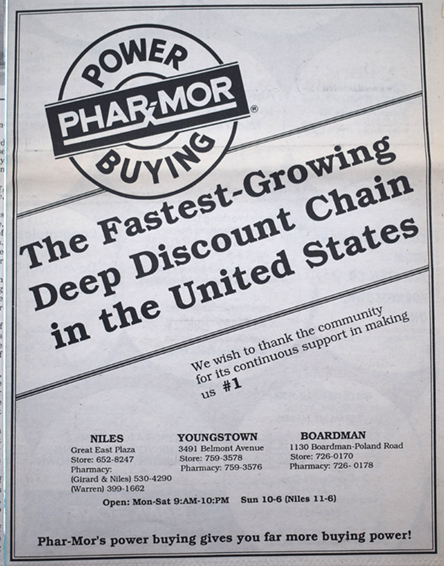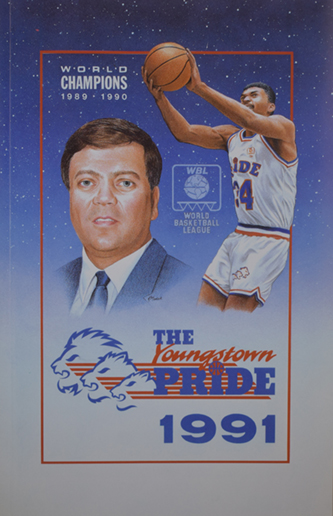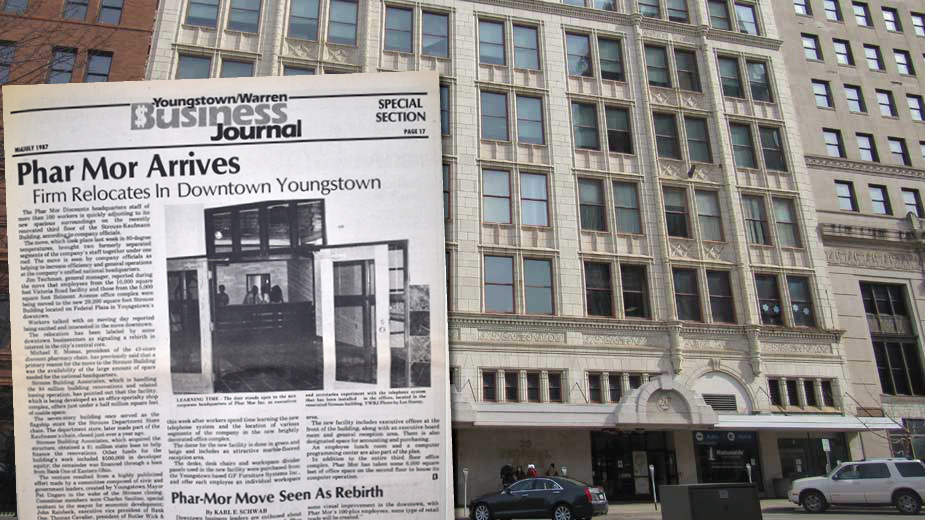YOUNGSTOWN, Ohio – A late-breaking development as the August 1992 edition of The Business Journal was going to press upended our lead story – and the future of a much-celebrated hometown success story and its retail wizard.
It happened July 28, 1992, and came in the form of a news release that suggested something was amiss with a local leader in business, philanthropy and professional sports.
“Phar-Mor Replaces Monus as President” blared the quickly rewritten headline for our story about the milestone opening of the deep discount retail chain’s 300th store, in what was then the new Ashtabula Mall. Instead, the revised story reported Phar-Mor’s board of directors had appointed CEO David Shapira as president and chief operating officer, demoting Michael I. “Mickey” Monus, the chain’s champion, to vice chairman.
At the time, Phar-Mor – self-described as the nation’s leading deep discount retailer of drugs and general merchandise – reported fiscal 1992 sales “exceeded $3 billion.”
In the news release, Monus hailed the corporate restructuring as “very positive.”
Added Shapira, “This will permit Mr. Monus to focus his talents and energy in the key areas of marketing, merchandising and procurement. … Phar-Mor is extremely well positioned for continued growth and profitability.”
In 1981, Shapira and Monus joined forces when the Shapira family of Pittsburgh, owners of the Giant Eagle Inc. grocery chain, purchased the Tamarkin Co., an Austintown-based grocery distribution company owned by the Monus family. Phar-Mor Inc. was founded in 1982 with Giant Eagle owning 50% of the new company.
When Phar-Mor announced July 22, 1992, that its 300th store would open at the Cafaro Co.-developed Ashtabula Mall, there was no indication that the celebration would be overshadowed a week later by the “change of responsibilities” at the retail chain, as a company spokesman termed it.
And at the store opening, Monus gleefully predicted the chain would hit 600 stores in five years.
Nine days later, he and two other executives were fired, accused by Shapira of inflating the chain’s inventory and earnings by $340 million and embezzling another $10 million.
On Aug. 17, 1992, Phar-Mor filed Chapter 11 bankruptcy.

Phar-Mor opened its first store in 1982 at the Great East Plaza in Niles and would quickly add stores throughout the Mahoning and Shenango valleys across the country as it rose to the 300-store milestone. It was reported that Walmart founder Sam Walton viewed Phar-Mor as his chain’s toughest competition.
Five years into its existence, the company helped to remake the landscape of the emptying-out downtown Youngstown. The chain established its headquarters in the landmark structure that housed the Strouss department store until its closing. The building was extensively renovated and rebranded as the Phar-Mor Centre.
“Phar-Mor’s employees will create momentum in the central city,” said Ken Gran, spokesman for the Downtown Board of Trade, in our MidJuly 1987 edition. “Not only will there be some visual improvement in the downtown, with Phar-Mor’s 100-plus employees, some type of retail trade will be created.”
A few months later, in November 1987, Youngstown State University would hire Gary Benson, its first Monus Professor of Entrepreneurship. The position was funded by a $300,000 endowment from Monus, who at the time served on the YSU Board of Trustees.
“Any time that a community is devastated as Youngstown has been by the loss of its major employer or industry,” Benson told The Business Journal, “there is a natural sort of grieving process the community goes through. But there comes a point in time when the community begins to set a new agenda.”
To his credit, a large part of the agenda Monus set was community pride. It would also be his downfall.
The Youngstown Pride was the name of the Ohio franchise that Monus and partner John Antonucci were awarded in fall 1987 for the newly formed International Basketball Association, which featured players under 6-foot-1. Attendance at the May 21, 1988, home opener set a record at the YSU Beeghly Center, the Pride’s home court. “It brings Youngstown together and that’s what we needed,” said a fan.
There were more cheers in November 1988 when Phar-Mor opened its 100th store on Tiffany Boulevard in Boardman.
“To think that it would go this far then would have been hard to speculate,” Monus said. He predicted another 14 stores would open by the end of 1988 and another 100 through 1990.
The opening of a new Boardman store came at the same time that the retailer enlisted Harry Anderson, star of NBC’s “Night Court,” for an advertising campaign intended to promote the company’s “power buying” message.
Carol Robinson, Phar-Mor vice president of advertising and public relations, said her department worked with a Pittsburgh advertising agency to develop a concept and settled on the tagline, “It’s not magic; it’s power buying.” That led them to search for a spokesperson with a background as a magician, a bill that Anderson – a former street magician – filled.
It all seemed to happen like magic.
Our November 1989 edition detailed Monus and Phar-Mor’s expanding sports interests, including sponsorship of professional women’s golf and tennis tournaments, as well as Youngstown’s U.S. International Peace Race, and as a media sponsor of the Pittsburgh Penguins and Pittsburgh Pirates.
“Our president is very involved in sports and really likes sports. But he also sees that it’s a way to reach out to people, to bring them together and help put Youngstown on the map,” said June Taylor, Phar-Mor purchasing director and liaison between the company and the Peace Race.

Not long after the first of the local Phar-Mor LPGA golf tournaments took place in July 1990 at Squaw Creek Country Club, Phar-Mor hit the 200-store mark with the opening of the 70,000-square-foot store in Hermitage, Pa., among the largest in the chain.
“It was close to the best opening we’ve ever had, and it was our best opening not during the Christmas season,” a spokesman said. The company was now focusing on expanding westward, with openings in Nevada, signed leases in Arizona and sites in California under consideration.
“By the end of this year, we will have opened 70 stores in 1990,” with plans to open another 70 the following year, Monus said. He anticipated reaching 300 stores by late 1991.
Closer to home, the company was working to convert the former Erie Terminal Building – adjacent to Phar-Mor Centre – into a training center for employees. “Within the next six months, we’ll be fully operational and moving the training center downtown” from the Liberty Township Phar-Mor, where it had been located, Monus said.
In MidMay 1991, Phar-Mor executives disclosed plans to expand from 250 stores to 300, and said the company was seeking investors. Sales for the first quarter were up 18% from a year earlier, they reported. And Monus predicted that sales could reach $3 billion if the stores were added by year-end.
A front-page story in our July 1991 edition reported that Phar-Mor had secured a $200 million investment from New York-based investment fund Corporate Partners, an affiliate of Lazard Freres & Co. “This transaction will enable us to fulfill growth plans well into the next decade. It brings us closer to reaching our potential as a national retailer,” Monus said.
But all was not rosy. One week before the $200 million investment was announced, The Wall Street Journal reported Phar-Mor had fallen behind in payments to distributors and was in a “cash crunch,” which company officials denied.
“We were aware of the rumors out there. But we got inside the company and made sure that we were able to distinguish facts from rumors and we’re comfortable with their financial position, both prior to our investment and after,” said Jonathan Kagan, managing partner of Corporate Partners.
“They now have the money to fund the growth,” he continued. “The money really is for more opportunity, not for problem-curing.”
Our July 1991 edition also reported on the YSU Alumni Association’s Distinguished Citizen Award dinner, where Monus’s father, Nathan, was honored. The dinner had taken place June 20, 1991, the same day that the university board of trustees rescinded its selection of attorney Paul Dutton, a Monus associate, as YSU president.
The controversial appointment of Dutton provided fodder for satirist Mark Russell, the keynote speaker for the event, who joked that he had accepted the offer to be YSU’s next president.
“Did you plan all of this knowing I was coming here? Most of the time I come to Youngstown, it’s just to thank the voters for Congressman Traficant,” he said.
Meanwhile, our MidJuly 1991 edition featured Monus associate Antonucci, president and CEO of Superior Beverage, who was poised to go west to head the Colorado Rockies, the Major League Baseball expansion team in which he and Monus were partners. “Mickey obviously has to watch and guard and operate Phar-Mor. So he’s going to stay in town,” Antonucci said.
In November 1991, the company said it would use a $112 million cash infusion to expand Phar-Mor’s distribution network and expand beyond the 273 stores in 31 states it now operated. Annual sales were projected to be $2.9 billion, a 45% increase from 1990.
A month later, Handel Investments announced that Phar-Mor would be one of the anchor stores of the new Shops at Boardman Park, relocating its existing Boardman store to what was described as “an 85,000-square-foot flagship facility.”
In January 1992, Phar-Mor reported it had increased sales by more than 40% and had established itself as a coast-to-coast retailer. It had 286 stores in 32 states, opening its first stores in New York, Delaware, Arkansas and California. It also had completed renovation of Erie Terminal.
Forbes magazine took notice in its ranking of the nation’s largest privately held companies, jumping Phar-Mor from 81st on its list to 49th.
“Now that we’re in New York and California, we consider ourselves a national concern,” Monus said. The $200 million from Corporate Partners and the $112 million from a separate private stock placement would “enable us to fulfill growth plans well into the next decade,” he said.
Next edition: The reckoning.
Pictured at top: When Phar-Mor moved its headquarters downtown, we published a section filled with stories and ads praising the move.

